Acum Surname Ancestry ResultsOur indexes 1000-1999 include entries for the spelling 'acum'. In the period you have requested, we have the following 12 records (displaying 1 to 10): Buy all | | | Get all 12 records to view, to save and print for £52.00 |
These sample scans are from the original record. You will get scans of the full pages or articles where the surname you searched for has been found. Your web browser may prevent the sample windows from opening; in this case please change your browser settings to allow pop-up windows from this site. Clerks and Clergy in Yorkshire, Nottinghamshire, and parts of Lancashire, Westmorland, and Northumberland
(1215-1255)
The register of archbishop Walter Gray of York, containing general diocesan business, mostly relating to clergy. The diocese of York at this period covered all of Yorkshire and Nottinghamshire, as well as Lancashire north of the Ribble, southern Westmorland, and Hexhamshire in Northumberland. The register survives as two rolls (called the Major and the Minor), in all amounting to nearly 71 feet of parchment. It is thought that a third roll or more has been lost, because the acts of the archbishop for the last ten years of his episcopate are missing, as are all the ordination and ecclesiastical discipline records for his reign. The then unpublished parts of the register were edited for the Surtees Society by James Raine and printed in 1870, with some additional material included in appendices.ACUM. Cost: £4.00.  | Sample scan, click to enlarge

| Yorkshire Inquisitions
(1241-1283)
Inquisitions post mortem are inquiries as to the real estate and heir of each person holding in capite or in chief, i. e. directly, from the Crown, or whose estates had been escheated or were in ward. The age and relationship of the heir are usually recorded. Inquisitions ad quod damnum enquired as to any activities (including maladministration by local officials) that had resulted in any material loss to the Crown. Both sets of inquisitions for this period were edited by William Brown for the Yorkshire Archaeological and Topographical Association, and printed in 1891. This index covers all names mentioned, including jurors, tenants, &c. ACUM. Cost: £4.00.  | Sample scan, click to enlarge
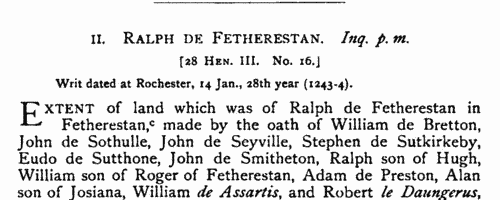
| Yorkshire Inquisitions
(1275-1295)
Inquisitions post mortem are inquiries as to the real estate and heir of each person holding in capite or in chief, i. e. directly, from the Crown, or whose estates had been escheated or were in ward. The age and relationship of the heir are usually recorded. Inquisitions ad quod damnum enquired as to any activities (including maladministration by local officials) that had resulted in any material loss to the Crown. Proofs of age are inquiries into the precise date of birth of an heir, usually involving local inhabitants recalling those circumstances which fixed that date in their mind. Yorkshire inquisitions for this period were edited by William Brown for the Yorkshire Archaeological Society, and printed in 1898. This index covers all names mentioned, including jurors, tenants, &c. ACUM. Cost: £4.00.  | Sample scan, click to enlarge
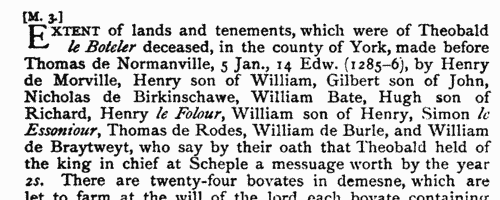
| Grantees of offices, commissions and pardons
(1317-1321)
The Patent Rolls are the Chancery enrolments of royal letters patent. Those for the 11th to the 14th years of the reign of king Edward II (8 July 1317 to 7 July 1321) were edited for the Public Record Office by G. F. Handcock, and published in 1903. The main contents are royal commissions and grants; ratifications of ecclesiastical estates; writs of aid to royal servants and purveyors; and pardons. Most extensive are the commissions of oyer and terminer to justices to investigate complaints about specific crimes and wrongs in particular counties.ACUM. Cost: £2.00.  | Sample scan, click to enlarge

| Charter Rolls
(1050-1326)
This abstract of the surviving charter rolls for 1300 to 1326, in the reigns of kings Edward I and II, was prepared by C. G. Crump and A. E. Stamp and published in 1908. The charter rolls not only recorded royal grants of lands, liberties and offices, but also enabled landowners to have their existing charters, their deeds of title, registered by the process of inspeximus and confirmation. After the Statute of Mortmain of 1279, this was of particular importance to religious houses, now greatly restricted in their ability to receive new donations of land, and anxious to prove title to their ancient property. Consequently, many charters of great age were copied onto the charter rolls.ACUM. Cost: £4.00.  | Sample scan, click to enlarge

| Landowners and tenants in Yorkshire
(1345-1485)
Inquisitions ad quod damnum were held by the appropriate sheriff or escheator (or other officer in whose bailiwick the matter in question might lie) to investigate cases in which the royal or public interest might be damaged by proposed alienation or settlement of land (especially alienation to religious uses, into mortmain). The key findings from these inquisitions were as to the tenure of the land and the service due from it; its yearly value; the lands remaining to the grantor, and whether they sufficed to discharge all duties and customs due from him; and whether he can still be put upon juries, assizes and recognitions, so that the country be not burdened by his withdrawal from them. Generally speaking, this process had the makings of a system of licensing such alienations, and raising money in proportion to the valuations. Equally, there are many items that deal with subjects such as the closing of public roads, the felling or inclosing of woods, or the proposed grant of liberties or immunities. A calendar of these inquisitions from the 19th year of the reign of king Edward III to the 2nd year of Richard III was prepared by the Public Record Office and published in 1906. We have now indexed this calendar by surname and county. Most of the individuals appearing in the calendar are either pious individuals seeking to make grants to religious bodies for the sake of their souls; or landowners securing the disposition and settling of their real estate. But some other names do appear - tenants, trustees, chaplains and clerks.ACUM. Cost: £6.00.  | Sample scan, click to enlarge
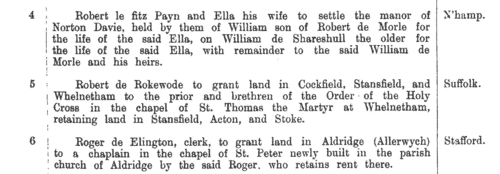
| Tradesmen of York
(1272-1558)
No man or woman could trade in the city of York without having obtained 'freedom' of the city.Their names were recorded on the 'Freemen's Roll', or Register of the Freemen of the City of York, which contains about 19,900 names for this period. A list of names was prepared for each year, the year being here reckoned as starting at Michaelmas (29 September) until 1373, and thence at Candlemas (2 February). Each annual list starts with the name of the mayor and the camerarii or chamberlains. The chamberlains were freemen charged with the duty of receiving the fees of the new freemen; of seeing that only freemen traded in the city; and of preparing this roll, which was compiled from the names on their own account books from the receipts for the fees. There are three groups of freemen: those who obtained freedom after serving out an apprenticeship to a freeman; the children of freemen; and those who claimed freedom by 'redemption', i. e. by purchase or gift from the Mayor and Court of Aldermen.
ACUM. Cost: £2.00.  | Sample scan, click to enlarge

| Bribed in Hull
(1854)
A Bill for the Prevention of Bribery in the Election of Members to serve in Parliament for the Borough of Kingston-upon-Hull, passed 11 April 1854, stated that a commission of inquiry 30 August 1853 had found that over a hundred voters were bribed at one or more of the elections for the borough in 1841, 1847 and 1852: the names of those bribed, and those who gave the bribes, were listed in the bill, and all those persons were disqualified from any future parliamentary elections for the borough.ACUM. Cost: £4.00.  | Sample scan, click to enlarge
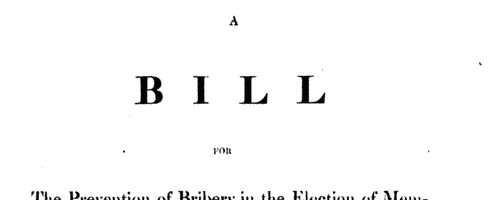
| Pupil Teachers training to become mistresses in Elementary Schools
(1875)
The Education Department set examinations for candidates for admission into training colleges, and to become teachers. This is the class list (in order of merit) of the men who took the examination to become mistresses in elementary schools at Christmas 1875. The candidates' names are listed alphabetically by surname within each division, with school in which engaged (N. for National School, Ch. Church of England, B. British School, W. Wesleyan, R. Roman Catholic, P. Parochial, Bd. Board School, Indl. Industrial School). (The sample scan is from a general class list for schoolmistresses)ACUM. Cost: £6.00.  | Sample scan, click to enlarge
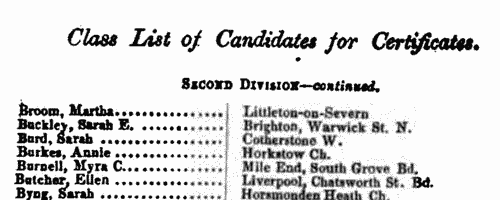
| Elementary Teachers in Hull
(1880)
The National Union of Elementary Teachers, established in 1870, brought together members of the profession throughout England and Wales, organized in local Teachers' Associations. Lists of members of the associations were printed in the annual reports. Each association's officers are listed first, then the ordinary members. Surnames are given, Mr/Mrs/Miss, initial(s), and the name of the school - B. S., British School; Bd. S., Board School; Congl. S., Congregational School; End. S., Endowed School; Gr. S., Grammar School; N. S., National School; Par. S., Parochial School; Pres. S., Presbyterian School; R. C. S., Roman Catholic School; Undl. S., Undenominational School; W. S., Wesleyan School.ACUM. Cost: £6.00.  | Sample scan, click to enlarge

|
| 1 | 2 |  |
Research your ancestry, family history, genealogy and one-name study by direct access to original records and archives indexed by surname.
|












